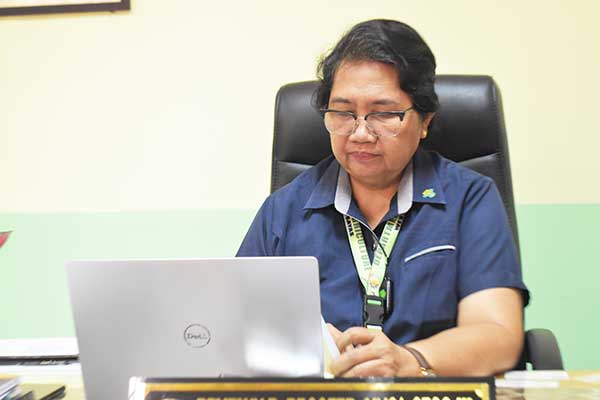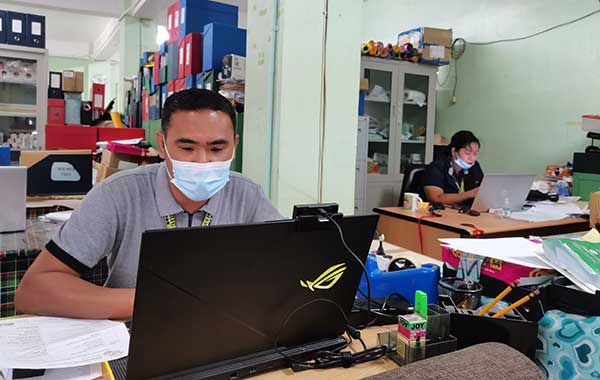
More than 150 stakeholders of Western Visayas’ swine industry convened via online platform on April 6 to discuss the Department of Agriculture’s (DA) quick recovery and response efforts as the dreaded hog virus that is African Swine Fever (ASF) continues to affect the supply and price stability of pork in red zone areas.
Although Western Visayas alongside Regions 4B, 7, 9 and Bangsamoro Autonomous Region of Muslim Mindanao remains free from ASF, the DA and the Bureau of Animal Industry here ensure that the local government units, animal raisers, traders, private sector, and academe are well-informed of the Integrated National Swine Production Initiatives for Recovery and Expansion (INSPIRE), Bantay ASF sa Barangay (BABay), indemnification, insurance, and lending programs.

“With more than 1.2 million hog population, 89 percent of our industry is composed of backyard raisers. We are number one in the country in terms of backyard hogs inventory wherein Negros Occidental constitutes 39 percent and Iloilo 34 percent in the region’s swine count,” DA Regional Executive Director Remelyn Recoter said.
Recoter called for the support of the LGUs and other partners in raising awareness of ASF and in alerting the public and farmers to report any suspicious and sudden swine mortality in their areas.
“With all these programs crafted under the leadership of Secretary William Dar, we hope to strengthen the monitoring, surveillance, biosecurity, and border controls to safeguard the more than P20 billion hog industry of the region especially now that the recent confirmed cases are getting nearer to us,” Recoter added.
Dr. John Roel Hilario, head of the BAI Veterinary Quarantine Station 6, commended the support of the private groups in helping the Regional ASF task force in informing the farmers on the biosecurity measures to observe, the traders on the proper disinfection protocols for all transport carriers to follow, and reminding the public to avoid swill feeding and patronizing pork products being sold online.

“Region 6 is still ASF-free but the consuming public could still feel the effect of the soaring prices of pork products. The situation may be favorable to our local hog raisers with the farm gate price of live hogs that reaches up to P170 per kilogram in contrast to the pricing before the pandemic that ranged only from P85 to P90 a kilo. There is an abnormal supply situation due to a shortage of hogs in Luzon. Our breeder base is affected because the national hog supply has not recovered yet from ASF,” said National Livestock Program Coordinator for Regional Operations Dr. Roland Fajardo.
Dr. Fajardo said the DA’s INSPIRE program aims to accelerate the repopulation and recovery of the hog industry by restoring the livelihoods of affected swine raisers, producing quality and genetically superior breeder stocks and finishers, modernizing the production environment in the green zones, and implementing stringent biosecurity protocols.
ASF has immensely affected the breeder base population. This prompted the DA to put up at least 16 breeder multiplier farms nationwide to be funded under the Bayanihan Act 2. According to Dr. Fajardo, a 60-sow level swine multiplier farm is set to rise at Aklan State University in Banga.
Areas not affected by ASF are eligible to expand the swine production and to pursue swine enterprises with up to P5 million credit support from the DA’s Agricultural Credit Policy Council (ACPC) through the farm clustering approach. “For farmers to be facilitated for funding from government financial institutions, they have to form an organization of at least 60 hog raiser-members,” he added.
ACPC has P500 million allocation for the swine credit while the Land Bank of the Philippines sets P15 billion and the Development Bank of the Philippines has a P12 billion loan portfolio.
On the other hand, BAI Director Dr. Reildren Morales said the BABAy ASF program seeks to bring down the ASF control measures to the barangay level. Intensifying the LGU engagement with the other stakeholders is one of the strategies being considered to effectively implement the program.
“The Agricultural Training Institute has ongoing training for biosecurity officers. DA is also procuring about P100 million worth of RT-PCR test kits for all the regions. We are strengthening the diagnostic examination that is why the DA is funding the locally developed molecular test kits to support surveillance particularly for environmental sampling,” he added.
Meanwhile, Jose Maria Torres of the Philippine Crop Insurance Corporation (PCIC) Region 6 said that they will provide insurance coverage to farmers who are listed under the Registry System for the Basic Sectors in Agriculture (RSBSA) in case that hogs of farmers have to be culled once infected by ASF or within the ground zero or 500-meter radius.
RSBSA-listed farmers can avail of P14,500 per head indemnity for the breeder, P34,000 per head for breeder parents, and P10,000 per head for fattener. In a recent press release, Agriculture Secretary William Dar said the DA will be doubling the indemnification payout from P5,000 to P10,000 per hog culled out due to ASF.
Regional ASF Task Force chairperson Dr. Jonic Natividad reminded farmers to be listed in the DA’s RSBSA to avail of the different response programs for ASF. He lauded the provincial governments for urgently amending the previously issued executive orders on ASF. He likewise urged municipal leaders to craft and implement local ordinances to block ASF incidents in the region.
DA Regional Technical Director for Operations Rene Famoso said that this one-day virtual orientation spearheaded by the Livestock Program coordinator Glenn Mariano is just among the lined-up activities that gear toward strengthening coordination among LGUs, farmers, and other key players in combating ASF entry. (S.M.H. Toreno /DA-RAFIS 6)


















